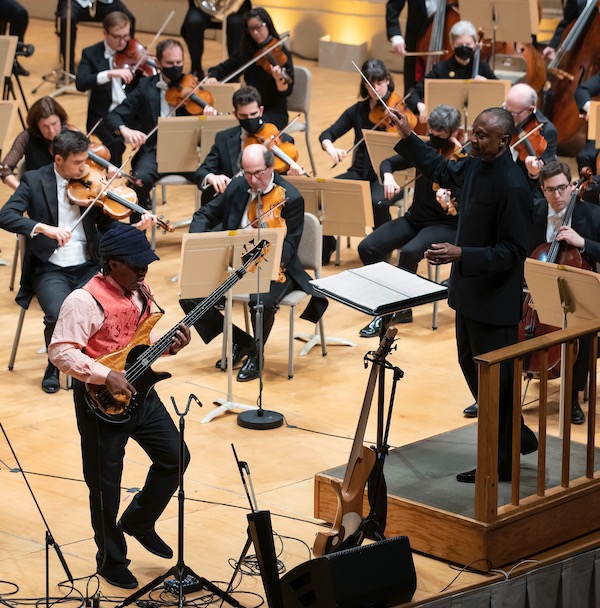Boston Symphony breaks new plugged-in ground with Wooten bass concerto

Bassist and composer Victor Wooten performs his La Lección Tres with Thomas Wilkins conducting the Boston Symphony Orchestra Thursday night at Symphony Hall. Photo: Winslow Townson
Last year’s Boston Symphony Orchestra concert of music by African-American composers was cancelled due to the pandemic. For the third annual celebration, Thomas Wilkins and the BSO broke new, plugged-in ground Thursday night at Symphony Hall: for the first time in 141 seasons, the ensemble presented a concerto for electric bass and orchestra.
The piece in question was Victor Wooten’s La Lección Tres, an expansion of Wooten’s 2008 solo-bass essay, “The Lesson.” Premiered in a livestream concert last June, Thursday night offered the first performance of La Lección before an in-person audience.
It’s a piece that certainly benefits from being heard live. One can fully appreciate the score’s theatrical elements – including, at the start of the finale, a vigorous duel between the soloist and orchestral bass section.
Wooten’s charismatic musicianship might also be classified among the latter. A virtuoso bassist, his technical chops are astonishing. La Lección puts them to the test, in the process calling for a pair of electric guitars: a fretted Fodera “yinyang” bass and another that can be played with a bow.
The composer’s wide-ranging musical background is reflected in the work’s stylistic versatility. Wooten’s writing moves easily between funk, soul, blues, rock, and classical points of reference.
The first movement opens nervously, with shards of scales and musical ideas passed between soloist and ensemble. Eventually these fragments coalesce in a seductive, bluesy theme before the movement peters out.
The second follows a similar structure. Here, bass harmonics and spare orchestral gestures develop into a sultry waltz that culminates in a jovial climax marked by boisterous percussion sonorities and handclaps.
Following a dramaturgic introduction, the finale commences with a snappy march-like theme. Castanets and trumpets lend the proceedings a Spanish flavor and the whole piece builds to a rousing final cadence.
La Lección is an undeniably terrific showpiece. And Thursday’s solo performance was brilliant—rhythmically taut, flexibly phrased, and multi-colored. Wooten’s writing for bass showcased the instrument’s full timbral capabilities, both in terms of register and tonal hues. The extended outer-movement episodes for bowed Fodera guitar were conspicuously effective.
Those qualities compensated for some compositional shortcomings. Chief among them is that Wooten’s orchestral writing is functional rather than inspired. Too often, the ensemble is relegated to a back-up role—one that, on Thursday night, was frequently covered by the solo bass’s amplification.
Nevertheless, La Lección is an ingratiating piece and was enthusiastically received by Thursday’s house.
The same reception was given to Samuel Coleridge-Taylor’s Suite from Hiawatha.
Left as a piano sketch at his death in 1912 and orchestrated posthumously by Percy Fletcher, the Suite compiles themes from Coleridge-Taylor’s three Hiawatha-themed cantatas: Hiawatha’s Wedding Feast, The Death of Minnehaha, and Hiawatha’s Departure. The five movements echo the style of Dvořák and, to a lesser extent, Puccini, while evoking the natural and emotional character of the corresponding scenes from Longfellow’s poems.
In Wilkins’ hands, though, these picturesque aspects were periodically muddled, as, generally, the music’s foreground and background textures lacked consistently strong definition.
However, when they were smartly differentiated—as in the languorous string and woodwind writing in “The Wooing” or the delicate woodwind-and-harp exchanges of the “Bird Scene” – the music took on a radiant sheen.
Similar balance issues persisted in the BSO’s performance of six movements from Duke Ellington’s Suite from The River—particularly in the driving “Vortex,” where the orchestral contributions were covered by, of all things, a snare drum.
Granted, this 1970 score isn’t one of Ellington’s masterpieces. Still, it does offer some fetching moments, and Wilkins drew the most balanced and idiomatic playing from the orchestra in the best of those: the swinging “Giggling Rapids,” atmospheric “Lake,” and stately “Village of the Virgins.”
The program will be repeated 8 p.m. Friday and Saturday, and 3 p.m. Sunday at Symphony Hall. bso.org; 888-266-1200.
Posted in Performances




